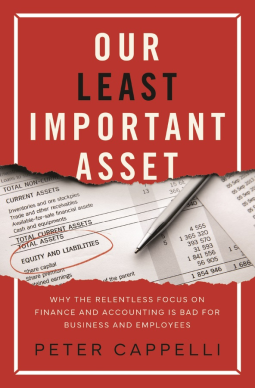
Our Least Important Asset
Why the Relentless Focus on Finance and Accounting is Bad for Business and Employees
by Peter Cappelli
This title was previously available on NetGalley and is now archived.
Send NetGalley books directly to your Kindle or Kindle app
1
To read on a Kindle or Kindle app, please add kindle@netgalley.com as an approved email address to receive files in your Amazon account. Click here for step-by-step instructions.
2
Also find your Kindle email address within your Amazon account, and enter it here.
Pub Date Jul 25 2023 | Archive Date Aug 07 2023
Talking about this book? Use #OurLeastImportantAsset #NetGalley. More hashtag tips!
Description
A comprehensive and insightful look at the modern workplace and how employees are managed, where the new approach is driven by the quirks of financial accounting to the detriment of employees and the long-term success of the organization.
Real wages have stagnated or declined for most workers, job insecurity has increased, and retirement income is uncertain. Hours of work for white collar employees have increased steadily, opportunities for advancement have withered, and evidence of the negative effects of workplace stress on health continues to accumulate. Why have jobs gotten so much worse?
As Peter Cappelli argues, these issues are not a result of companies trying to be cost effective. They stem from the logic of financial accounting--the arbiter for determining whether a company is maximizing shareholder value--and its fundamental flaws in dealing with human capital. Financial accounting views employee costs as fixed costs that cannot be reduced and fails to account for the costs of bad employees and poor management. The simple goal of today's executives is to drive down employment costs, even if it raises costs elsewhere.
In Our Least Important Asset, Cappelli argues that the financial accounting problem explains many puzzling practices in contemporary management--employers' emphasis on costs per hire over the quality of hires, the replacement of regular employees with "leased" workers, the shift to unlimited vacations, and the transition of hiring responsibilities from professional recruiters to more expensive line managers. In the process, employers undercut all the evidence about what works to improve the quality, productivity, and creativity of workers. Drawing on decades of experience and research, Cappelli provides a comprehensive and insightful critique of the modern workplace where the gaps in financial accounting make things worse for everyone, from employees to investors.
About the Author:
Peter Cappelli is the George W. Taylor Professor of Management at The Wharton School and Director of Wharton’s Center for Human Resources. He is also a Research Associate at the National Bureau of Economic Research in Cambridge, MA, served as Senior Advisor to the Kingdom of Bahrain for Employment Policy from 2003-2005, and since 2007 is a Distinguished Scholar of the Ministry of Manpower for Singapore. He has degrees in industrial relations from Cornell University and in labor economics from Oxford where he was a Fulbright Scholar. He has been a Guest Scholar at the Brookings Institution, a German Marshall Fund Fellow, and a faculty member at MIT, the University of Illinois, and the University of California at Berkeley. He was a staff member on the U.S. Secretary of Labor’s Commission on Workforce Quality and Labor Market Efficiency from 1988-’90, Co-Director of the U.S. Department of Education’s National Center on the Educational Quality of the Workforce, and a member of the Executive Committee of the U.S. Department of Education’s National Center on Post-Secondary Improvement at Stanford University.
Professor Cappelli has served on three committees of the National Academy of Sciences and three panels of the National Goals for Education. He was recently named by HR Magazine as one of the top 5 most influential management thinkers, by NPR as one of the 50 influencers in the field of aging, and was elected a fellow of the National Academy of Human Resources. He received the 2009 PRO award from the International Association of Corporate and Professional Recruiters for contributions to human resources. He served on the Global Agenda Council on Employment for the World Economic Forum and a number of advisory boards.
Professor Cappelli’s recent research examines changes in employment relations in the U.S. and their implications. These publications include The New Deal at Work: Managing the Market-Driven Workforce, which examines the decline in lifetime employment relationships, Talent Management: Managing Talent in an Age of Uncertainty, which outlines the strategies that employers should consider in developing and managing talent (named a “best business book” for 2008 by Booz-Allen), and The India Way: How India’s Top Business Leaders are Revolutionizing Management (with colleagues), which describes a mission-driven and employee-focused approach to strategy and competitiveness. His 2012 book Managing the Older Work (with Bill Novelli) dispels myths about older workers and describes how employers can best engage them. Why Good People Can’t Get Jobs identifies shortfalls with current hiring practices and training practices . It was excerpted in Time Magazine (online), reviewed in the Wall Street Journal, The New Yorker, and most major business publications, and was an Amazon Best Seller in 2017. Will College Pay Off? explores the relationship between college degrees and jobs, identifying the factors that determine whether investments in college degrees will lead to good jobs. It was reviewed in the Wall Street Journal, the Financial Times, and excerpts appeared in Time Magazine, The Washington Post, The New Yorker, and other publications. Related work on managing retention, electronic recruiting, and changing career paths appears in the Harvard Business Review where the article Why We Love to Hate HR was the cover story of the August, 2015 issue. The Performance Appraisal Revolution with Anna Tavis appeared in the November issue of HBR in 2016.
A Note From the Publisher
The author is available for select interviews and discussions.
Advance Praise
"...a timely study that connects present-day labor shortages to the dehumanizing irrationality of the modern workplace." -- Publishers Weekly
"How and why are corporate jobs getting worse and worse over time? Peter Cappelli's latest book answers both these questions: corporations are pushed by accounting demands to squeeze employment costs and to rely on contractors and outsourcing to keep these costs off their books-even at the expense of HR practices supported by decades of research and experience. Our Least Important Asset is an arresting take on the source of our current employment malaise." -- Jerry Davis, University of Michigan
"Human capital expert Peter Cappelli has written an important new book addressing the fundamental question of why policies that value and build human capital are not only rare in practice but increasingly implemented. His insightful answer: financial accounting measures lead to a lose-lose situation in which companies and their employees suffer. Just as the ESG movement has broadened reporting, so the answer to improved productivity and employee wellbeing must begin in changes in accounting measures." -- Jeffrey Pfeffer, Stanford Graduate School of Business
"Peter Cappelli, one of the leading scholars of workforce management, offers a compelling explanation of the decline of human resource practices like careful hiring and performance evaluation and investment in training. Corporate fixation with shareholder value maximization operationalized through financial accounting practices has turned employees from a perceived asset to a liability. Cappelli's probing analysis shows that the popular bromide of convincing corporate leaders 'to do well by doing good' is not sufficient to stem the erosion of work. That makes Our Least Important Asset a must read for those who care about the future of work and workers." -- David Weil, Brandeis University
Available Editions
| EDITION | Hardcover |
| ISBN | 9780197629802 |
| PRICE | $29.95 (USD) |





